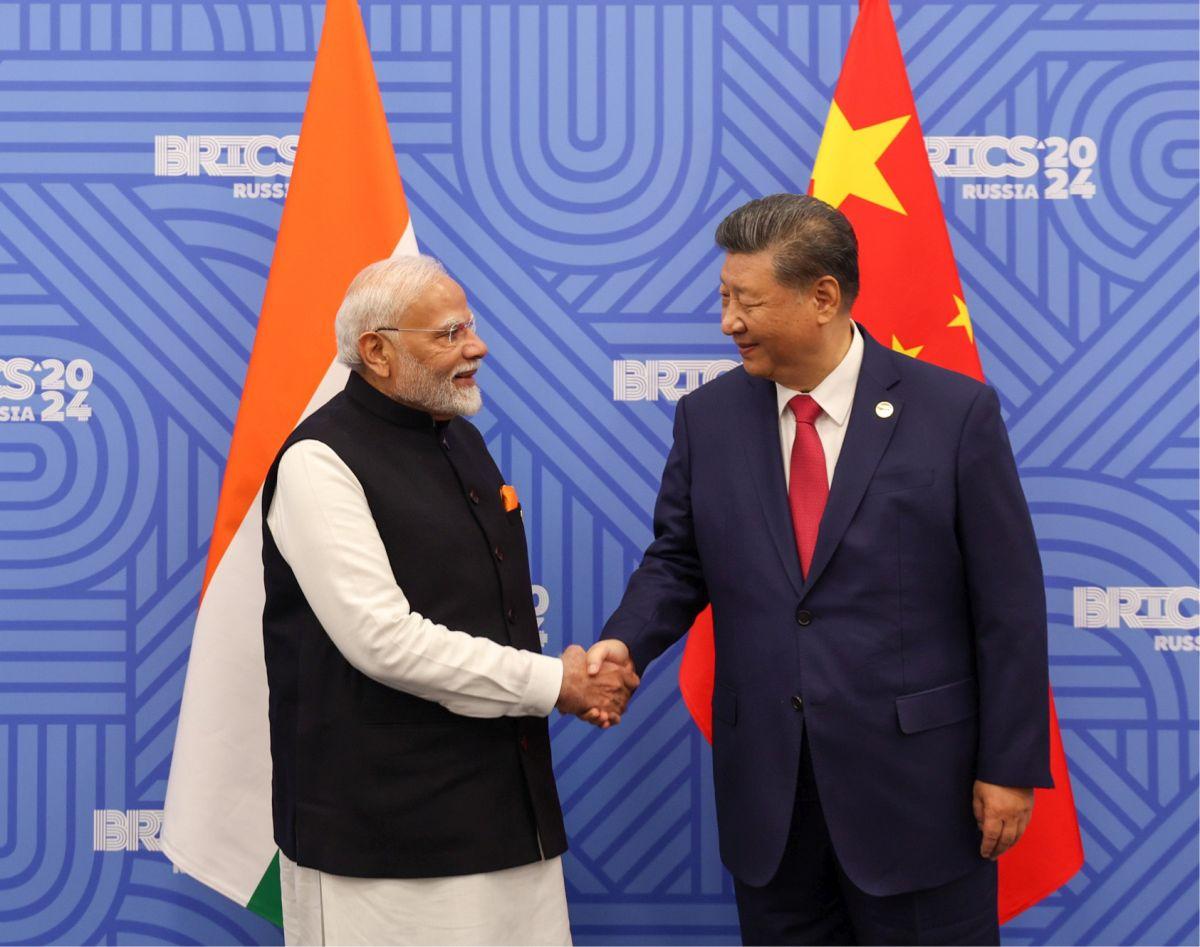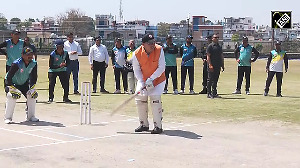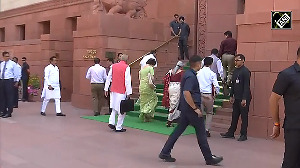''Given China's past behaviour and their territorial claims, should we be sceptical regarding China's willingness to adhere to these agreements fully? The answer is yes.'
'As Ronald Reagan famously said in the context of the SALT talks, 'Trust, but verify!' India should also do the same.'
'This has already begun with foot patrolling, drones, satellite imagery and so on. India's military deployment did mirror China's and will continue to do so in the future.'

While engaging with China is necessary for regional stability, India must approach this relationship with caution, points out retired Lieutenant General Gautam Moorthy, founder and managing director, Current Affairs Strategic Forum, an independent virtual think-tank.
General Moorthy was former Director General, Army Ordnance Corps and administrative member, Armed Forces Tribunal.
"By focusing on verification of agreements, enhancing military preparedness, maintaining strong diplomatic ties without compromising sovereignty, reducing economic vulnerabilities, and strengthening regional alliances, India can better navigate the complexities of its relationship with China," the general tells Rediff.com's Archana Masih in an e-mail interview.
Military experts say that completing the entire process of de-induction and withdrawal of the massive number of troops will be a long drawn process. What according you are the next crucial steps that lie ahead -- militarily, diplomatically and politically?
There is no doubt that the breakthrough and the measures agreed to at the recent BRICS Summit in Russia will be a long drawn-out process in all the domains that you mention.
Let us not forget what lay behind this. It involved over four-and-a-half-years of intense and extensive negotiations involving 31 rounds of diplomatic talks through the Working Mechanism for Consultation and Coordination on India-China Border Affairs and 21 rounds of military talks at the corps commander level.
They also included discussions during meetings between External Affairs Minister S Jaishankar and Chinese Foreign Minister Wang Yi.
In fact every meeting at that level emphasised the urgency of resolving outstanding issues along the Line of Actual Control.
The culmination of these efforts reflects a concerted push from both sides to stabilise our relationship following the Chinese deployments in Eastern Ladakh in April 2020 and the heightened tensions between us two countries that continued in a downward spiral.
So at the very least, this downward spiral has been arrested.
I shall try and list out the next crucial steps that I believe will follow logically.
Political
There is a definite shift in the political dynamics at play here. It was very visible and evident in the televised meeting between the two delegations at Kazan headed by PM Narendra Modi and President Xi Jinping.
This signals a readiness for high-level political dialogue, setting the stage for future engagements that prioritise mutual interests over historical disagreements. This is seen as crucial for both nations as they navigate their respective roles in a multipolar world.
Geopolitical
I stress, that more than the political, it is in the geopolitical domain that this thaw could create issues for the US and its allies and for the QUAD. It could lead to a re-evaluation of India's commitment to the QUAD in countering China's influence in the Indo-Pacific region.
A more cooperative India will be seen as diluting the QUAD's effectiveness as New Delhi balances its relationships with both Washington and Beijing.
Diplomatic
Diplomatically, the resumption of border patrols and discussions on disengagement from contentious areas like Ladakh indicate a commitment to resolving outstanding issues peacefully. Both countries have expressed intentions to enhance trade ties, which is vital given China's status as India's largest trading partner.
The focus on economic collaboration is particularly relevant as both nations face external pressures, including US decoupling strategies that threaten their economic interests. This will get increased salience if Mr Trump is elected as president.
The talks also aimed to establish a framework for ongoing communication regarding border management and strategic cooperation in areas such as manufacturing and infrastructure development. This shift reflects a recognition of our interdependence.
This also serves as a framework for ongoing negotiations aimed at resolving our territorial disputes, in stabilising relations and at the same time, recognising that a comprehensive resolution of unresolved issues will take its own time.
Military
Militarily, the agreement to reduce troop presence at disputed border points represents a significant step towards de-escalation.
The potential for new 'buffer zones' where both sides withdraw troops could help prevent future conflicts similar to the 2020 Galwan Valley clash that resulted in casualties on both sides.
Given China's past behaviour and their territorial claims, should we be sceptical regarding China's willingness to adhere to these agreements fully? The answer is yes. As Ronald Reagan famously said in the context of the SALT talks, 'Trust, but verify!' India should also do the same.
This has already begun with foot patrolling, drones, satellite imagery and so on. India's military deployment did mirror China's and will continue to do so in the future.
De-induction will likely follow, but it will not or rather should not be at the cost of our military preparedness, capacity enhancement and capability building. The evolving military landscape will require India to balance its defence readiness (and by this I mean not just our army but the other two services -- the Indian Navy and IAF too) with diplomatic engagement.
In summary, the recent thaw in India-China relations holds hope for improved political dialogue, enhanced trade ties, and potential military de-escalation.
However, the sustainability of this thaw will depend on both nations' ability to navigate their historical differences while addressing contemporary challenges posed by external powers and internal dynamics which will play out differently for both countries.
As we move forward, careful management of our relationship will be crucial for regional stability and our respective national interests.
Finally, both nations are motivated by economic interests and security concerns, as we aim to stabilise our historically difficult relationship.

In view of China's consistent gross disregard for signed agreements and protocols in the past, what should India be cautious about in dealing with China going forward?
In light of China's historical disregard for agreements and protocols, India should exercise caution in several areas while engaging with China moving forward:
Trust Issues
Given China's past actions, India should adopt a 'Trust, but verify' approach as I have just said. This means closely monitoring China's adherence to all agreements reached, particularly those concerning military disengagement and border management.
Historical precedents suggest that China may not consistently honour its commitments, making vigilance essential.
Diplomatic Engagement
While pursuing diplomatic dialogue is important, we should remain cautious about making concessions that could undermine its strategic interests. Negotiations should not compromise India's sovereignty or security, especially regarding sensitive issues like border demarcation and our military deployments.
Military Preparedness
India must continue to enhance its military capabilities in response to China's increasing military power. With China's rapid advancements in naval and aerial capabilities, India should prioritise modernising its armed forces and improving infrastructure along the border to deter potential aggression.
Economic Dependencies
India should be wary of becoming economically dependent on China. This includes diversifying trade partners and reducing reliance on Chinese imports, particularly in critical sectors such as technology and pharmaceuticals.
Such steps can mitigate risks associated with economic coercion.

Regional Alliances
Strengthening Strategic Partnerships: India should continue to bolster its alliances with other countries, particularly those in the QUAD (the US, Japan and Australia). In fact a QUAD Plus to include South Korea, the Philippines and Indonesia should be what we ought to be working towards. Strengthening these partnerships can provide a counterbalance to China's influence in the region and enhance India's security posture.
Monitoring Chinese Activities
Awareness of Chinese Influence: India needs to remain vigilant about China's strategic initiatives in neighbouring countries, Pakistan, Bangladesh, Sri Lanka, Maldives, Myanmar, Nepal, and Bhutan.
Monitoring these developments is crucial to counter any encroachments on India's sphere of influence and address potential security threats.
Political Statements: India should be able to read into statements made by Chinese leaders and be able to pick up nuances. Understanding their messaging is important.
Our political leaders both within the government and in the Opposition too must be wary of what they say with respect to China to avoid any misunderstandings that could roll this process back.
In summary, while engaging with China is necessary for regional stability, India must approach this relationship with caution.
By focusing on verification of agreements, enhancing military preparedness, maintaining strong diplomatic ties without compromising sovereignty, reducing economic vulnerabilities, and strengthening regional alliances, India can better navigate the complexities of its relationship with China.

Former Foreign Secretary Shyam Saran pointed out that the other points of contention in eastern Ladakh which had been resolved now had buffer zones between the two troops which neither side could intrude, hence it would be incorrect to say that the situation had gone back to the pre-2020 position.
Do you believe we can reach the status quo ante 2020?
Mr Shyam Saran has made this statement earlier last week. However, it has been reported in the media that the PLA has dismantled its temporary structures and pulled back to the pre-April 2020 positions.
Patrolling is being conducted in Demchock as hitherto and is likely to resume in Depsang shortly. The patrols will have full unrestricted access to the five PPs (Patrolling Points) in Depsang and two in Demchock which were blocked by the PLA post Apr 2020.
Troops will soon be able to patrol up to the pass Charding La which is at 19,000 feet. After stabilisation, the focus will be on patrolling in the 'buffer zones' that were established. These buffer zones fell in our perception of the LAC. Although this has not yet taken place, it appears that the agreement has indeed taken our sensitivities into consideration and we have achieved what we wanted.
More importantly for the locals, the herders can access their traditional grazing grounds there.
Or considering the complex and difficult relationship that we have with China, progress can only be made phase wises, by taking one careful step after another?
This is absolutely correct. We cannot take anything for granted. I'll never tire of repeating the adage, 'Trust but verify!'
The clash at Galwan is reported to have happened because our troops went to a particular spot to see if the PLA had taken down the structures that they had put up earlier. They had not. A verbal admonition resulted in the manhandling of the commanding officer by the PLA that incensed our troops who came back with reinforcements and then the clash began.
This kind of a situation must be avoided going forward. Cool heads should prevail and reliance must be placed on technological means too to ensure verification.
Progress is needed not only on the boundary issue, but in other domains too. Our EAM had been insisting over the past four years and more, that progress cannot be made on other issues till status quo ante is achieved. Now that has been done, we can surely go ahead.
- Part II of the Interview: 'Ladakh Made The World Wary Of China'
Feature Presentation: Aslam Hunani/Rediff.com






 © 2025
© 2025